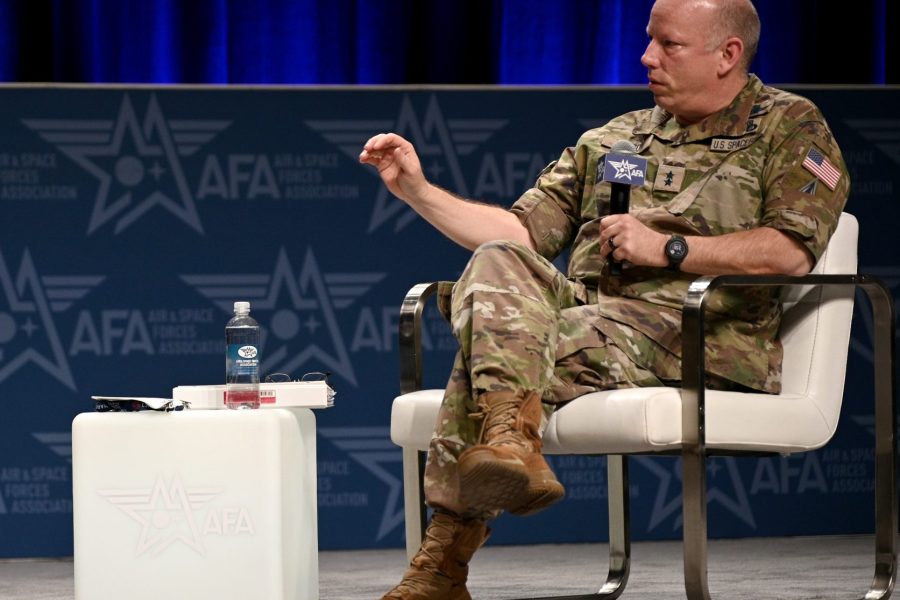The acting head of space acquisition wants to double down on changes instituted by Frank Calvelli, who vacated the job Jan. 20, pledging stricter accountability not only for contractors but program managers, as well.
Maj. Gen. Stephen G. Purdy, military deputy to the assistant secretary of the Air Force for space acquisition and integration, is leading the office until a new political appointee is in place. But he’s holding fast to Calvelli’s acquisition tenets, devised from his long experience developing space programs at the NRO. Calvelli pressed the Space Force to buy smaller satellites and load them with as much commercial technology as possible to accelerate timelines. He also favored fixed-price contracts.
“The plan that we have is to continue the Calvelli tenets,” Purdy said at the National Security Space Association’s conference this week. “If anything, think of us continuing those efforts, but doing it more aggressively.”
Calvelli was open about his frustrations with both industry’s and USSF’s approach to acquisition, and promoted lessons learned on the job at NRO—especially the “relentless pursuit of program management discipline.”
Purdy likewise cited the proven business practices embraced by NRO. “They’re able to do trades within their systems,” he said. “They’re able to make architectural trades, funding trades, commercial trades. They really understand the commercial market and how they kind of tap into some of those [capabilities] in some of their missions.”
President Donald Trump has not yet nominated a successor to Calvelli, but he did nominate Calvelli’s successor at NRO, Troy Meink, to be the next Air Force Secretary. That suggests the NRO’s approach is likely to live on in the Space Force, said Todd Harrison, a space and budget analyst for the American Enterprise Institute.
“I think there will be some differences, of course, and I think the language will definitely change,” he said. “You know, they may not be called tenets, they might be called principles or whatever, but I think that there will be a lot of overlap and a lot of continuity.”
Yet even as Calvelli won praise from lawmakers, industry was less favorable, Harrison said. “A lot of the legacy space companies hate fixed-price and they keep threatening not to bid on things,” he explained. “Those same companies are also pushing against a lot of these newer architectures that use smaller satellites and larger numbers, proliferated, because it doesn’t advantage them.”
Purdy emphasized performance and the Space Force’s willingness to cancel programs if contractors fail. “From May 2022 to today, we’re at about 14 major acquisition programs that have had contracts or entire programs restructured or canceled. Why? Typically due to performance,” he said. “Costs have skyrocketed. We weren’t getting the capability we need. And unlike the Space Force acquisition of old, we’re not just piling money into that. So we’ve stopped these contracts, and we’ve re-competed for the most part.”
Purdy said his unclassified programs are split roughly 50/50 between fixed-price and cost-plus contracts and that he would like to see the balance tilt more toward fixed-price. But the problems aren’t all with contractors, he said. Accountability is a “two-way street,” Purdy said, so his office is “looking at taking action against poor performing U.S. government program managers.” That would start with giving them additional resources and scrutiny, but potentially go up to removals.
In response to a query from Air & Space Forces Magazine, an Air Force spokesperson said program managers are judged on factors like “how they are able to address challenges within their span of control, decision-making skills, communication, implementation of guidance such as the Service Acquisition Executive’s published Acquisition Tenants, and other basic program management skills.”
The most important one, however, is that “they deliver their capability as rapidly as possible while performing the traditional trades between cost, schedule, and performance,” the spokesperson added.
Ensuring accountability for program managers may be harder than it sounds, Harrison warned. Typically, program managers can cycle in and out every two or three years.
“It can take a very long time for a program manager’s decisions to actually bear fruit,” he said. “And so when a program goes bad, it may be because of what the previous program manager did, or it may be unclear whose fault it was. So I think one of the most important things in establishing accountability is making program managers stick with the program much longer.”
Going faster is one way to overcome such concerns. Calvelli pushed for shorter contracts, as short as three years from start to launch, and Purdy cited the Resilient GPS program and the Space Development Agency as models for producing capability on fast timelines previously not seen in military space programs.
“My direction to all [program managers] is SDA and R-GPS timelines are the new norm,” Purdy said. “Beat those timelines. So that’s the goal.”
Purdy’s approval of the Space Development Agency comes as its leader is under investigation and suspended from duty. Derek Tournear was placed on administrative leave just before Inauguration Day. The agency, which has pressed an ambitious agenda to field a proliferated space architecture in low-Earth orbit, is under a cloud, with media reports citing a Pentagon memo calling for an “independent review team” to determine the “health” of SDA and its programs, and consider whether it should remain a semi-independent acquisition arm within the Space Force.
Air & Space Forces Magazine has confirmed that the memo exists, but has not reviewed its contents. The Department of the Air Force declined to comment.
Tournear is under investigation for actions related to a contractor protest.
“We’re at a pivotal moment here,” Harrison said, worrying that the consolidation or elimination of SDA could send the Space Force back to the Pentagon’s “old mindset of going slow, focusing on mission assurance, and progressively falling behind.”
Harrison suggested that could be a disaster for the Space Force: “It’s absolutely critical that the SDA continues and its proliferated architecture continues,” he said.
